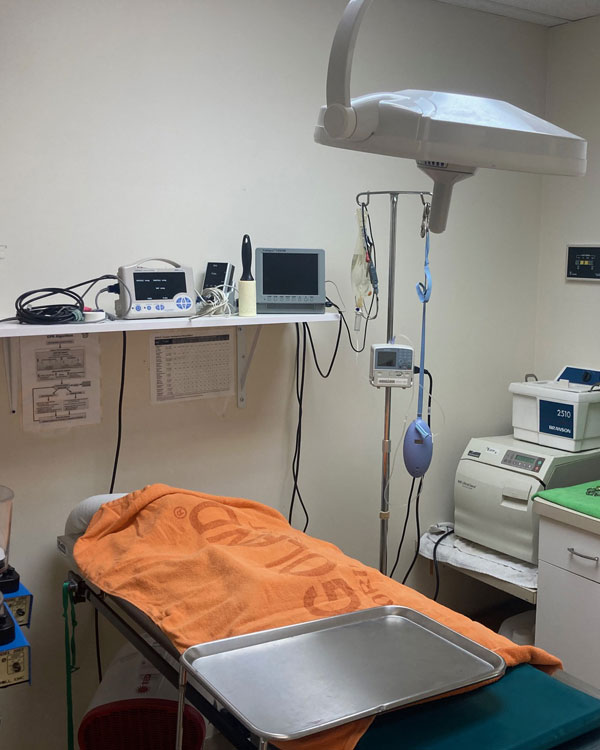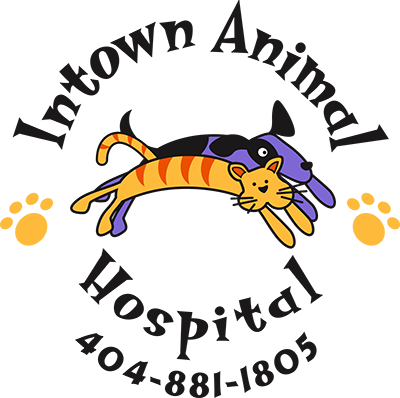Pet Soft Tissue Surgery
When your pet needs surgery, our skilled veterinarians at Intown Animal Hospital deliver personalized care backed by decades of surgical experience and a commitment to the highest standards in veterinary medicine.
Compassionate Surgical Solutions for Pets
For everything from routine mass removals to complex interventions, you can trust our AAHA-accredited hospital for expert soft tissue surgery in Atlanta, GA.
What Is Pet Soft Tissue Surgery?
Soft tissue surgery refers to any procedure that involves internal organs, skin, or muscles — essentially, anything outside the bones and joints. These surgeries are performed to treat a wide range of conditions affecting your pet’s overall health, comfort, and quality of life.

Common soft tissue procedures we perform at Intown Animal Hospital include:
- Tumor and mass removals (benign or malignant)
- Laceration and wound repairs
- Abscess drainage
- Cystotomies (bladder stone removal)
- Gastrointestinal surgeries (foreign body removal, biopsies)
- Splenectomies and other organ-related surgeries
- Enucleations (eye removal for severe trauma or disease)
All procedures are performed in our state-of-the-art surgical suite, where we prioritize safety, comfort, and the best outcomes for your pet.
Why Soft Tissue Surgery Matters
Surgery can be life-saving or life-enhancing, depending on the condition being treated. Some problems — like internal bleeding, tumors, or bladder stones — require immediate intervention. Others may be considered elective, but are still necessary to improve quality of life, reduce pain, or prevent complications.
Benefits of timely surgical intervention include:
- Alleviation of pain or discomfort
- Removal of cancerous or potentially harmful growths
- Restoration of normal organ function
- Improved mobility, digestion, or breathing
- Prevention of further illness or infection
At Intown Animal Hospital, we take the time to explain your pet’s diagnosis and why surgery is the best path forward, so you can make decisions with confidence. Our goal is to ensure you are fully informed about your pet’s status and the best options available.

What to Expect Before, During & After Surgery
When you bring your pet in for a veterinary surgery consultation, we’ll walk you through every step of the process:
01
Pre-Surgical Examination & Diagnostics
We evaluate your pet’s health and may recommend lab work or imaging (such as X-rays) to safely plan the procedure.
02
Anesthesia & Monitoring
We use the safest available anesthetics and continuously monitor your pet’s vital signs during surgery.
03
Surgical Procedure
Our experienced veterinary surgeons perform the operation in a sterile, AAHA-accredited environment using modern tools and techniques.
04
Post-Operative Pain Management & Recovery
Your pet’s comfort is our priority. We provide pain control, wound care instructions, and follow-up support to ensure a smooth recovery.
05
Clear Communication with You
We stay in close contact before and after surgery to address any concerns and answer your questions with empathy and clarity.

Why Choose Intown Animal Hospital for Pet Surgery?
With over 20 years of serving Atlanta pet families, Intown Animal Hospital has built a reputation for quality, compassionate care. When you entrust us with your pet’s surgical needs, you benefit from:
AAHA Accreditation
We meet the highest national standards in veterinary surgery, safety, and patient care.
Experienced Veterinary Surgeons
Our team is trained in advanced surgical procedures and techniques.
Modern Surgical Suite
Equipped with the latest monitoring and sterilization equipment to ensure precision and safety.
Family-Focused Philosophy
We treat every pet like our own, offering supportive communication and thorough aftercare.
Two Convenient Locations
Serving pets in Morningside, Midtown, and across Atlanta, GA.
Surgery FAQs
Is the anesthetic safe?
Today’s modern anesthetic monitors have made surgery much safer than in the past. Here at Intown Animal Hospital, we do a thorough physical exam on your pet before administering anesthetics to ensure that a fever or other illness won’t be a problem. We also adjust the amount and type of anesthetic used depending on your pet’s health. The handout on anesthesia explains this in greater detail.
Pre-anesthetic blood testing is important in reducing the risk of anesthesia. Every pet needs blood testing before surgery to ensure that the liver and kidneys can handle the anesthetic. Even apparently healthy animals can have serious organ system problems that cannot be detected without blood testing. If there is a problem, it is much better to find it before it causes anesthetic or surgical complications. Animals with minor dysfunction will handle the anesthetic better if they receive IV fluids during surgery. If serious problems are detected, surgery can be postponed until the problem is corrected.
We offer three levels of in-house blood testing before surgery, which we will go over with you when you bring your pet in. Our doctors prefer the more comprehensive screen because it gives them the most information to ensure your pet’s safety. For geriatric or ill pets, additional blood tests, electrocardiograms, or X-rays may also be required before surgery.
It is important that surgery be done on an empty stomach to reduce the risk of vomiting during and after anesthesia. You will need to withhold all food after 8 PM the night before your pet’s surgery. Water can be left down for the pet until the morning of surgery.
Will my pet have stitches?
For many surgeries, we use absorbable sutures underneath the skin. These will dissolve independently and do not need to be removed later. Some surgeries, especially tumor removals, do require skin stitches. With either type of suture, you will need to keep an eye on the incision for swelling or discharge. Most dogs and cats do not lick excessively or chew at the incision, but this is an occasional problem you will also need to watch for. If there are skin sutures, these will usually be removed 10 to 14 days after surgery. You will also need to limit your pet’s activity level for a time, and no baths are allowed for the first 10 days after surgery.
Will my pet be in pain?
Anything that causes pain in people can be expected to cause pain in animals. Pets may not show the same symptoms of pain as people do; they usually don’t whine or cry, but you can be sure they feel it. The pain medications needed will depend on the surgery performed. Major procedures require more pain relief than things like minor lacerations.
For dogs, we may recommend an oral anti-inflammatory the day after surgery and several days after to lessen the risk of discomfort and swelling. We use newer medications, which are less likely to cause stomach upset and can be given even on the morning of surgery.
Because cats do not tolerate standard pain medications such as aspirin, ibuprofen, or Tylenol, we are limited in what we can give them. Recent advances in pain medications have allowed for better pain control in cats than ever before. We administer a pain injection 10 minutes prior to surgery. After surgery, pain medication is given on a case-by-case basis. Any animal that appears in pain will receive additional medication.
We use narcotic patches for some surgeries in dogs as well. The cost will depend on the size of the dog. Injectable pain medications may also be used after surgery on both dogs and cats. Providing whatever pain relief is appropriate is a humane and caring thing to do for your pet.
What other decisions do I need to make?
While your pet is under anesthesia, it is the ideal time to perform other minor procedures, such as dentistry, ear cleaning, or implanting an identification microchip. If you would like an estimate for these extra services, please call ahead of time. This is especially important if the person dropping the pet off for surgery is not the primary decision-maker for the pet’s care.
When you bring your pet in for surgery, we will need 5 to 10 minutes of your time to fill out paperwork and make decisions on the blood testing and other options available. When you pick up your pet after surgery, you can also plan to spend about 10 minutes going over your pet’s home care needs.
We will call you the night before your scheduled surgery appointment to confirm the time you will be dropping your pet off and to answer any questions you might have. In the meantime, please don’t hesitate to contact us with any questions about your pet’s health or surgery.
What is pre-anesthetic blood screening?
This is a blood test that is run in the clinic prior to surgery. It tests your pet’s organ functions, blood counts, and clotting function. The pre-anesthetic blood screening assures safety during surgery and the ability to heal following surgery.
How long do the sutures stay in after my pet’s surgery?
Procedures involving sutures require them to be removed 14 days following the surgery.
Schedule a Surgical Consultation Today
If your pet needs surgery, count on Intown Animal Hospital for skilled, compassionate pet soft tissue surgery in Atlanta, GA. From consultation to recovery, we’re here to support you both every step of the way. Book your appointment now.
